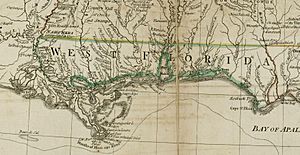Battle of Mobile (1781) facts for kids
Quick facts for kids 2nd Battle of Mobile |
|||||||
|---|---|---|---|---|---|---|---|
| Part of the Gulf Coast campaign | |||||||
 Detail from a 1776 showing British West Florida |
|||||||
|
|||||||
| Belligerents | |||||||
Waldeck-Pyrmont mercenaries |
|||||||
| Commanders and leaders | |||||||
| Ramon de Castro | Johann von Hanxleden † Philip Barton Key Robert Deans |
||||||
| Strength | |||||||
| 200 regulars | 100 60th Royal American Regiment of Foot 261 Pennsylvania, West Florida Forester, & Maryland loyalist militia 420 Indians 60 Waldeckers 2 frigates 1 bilander |
||||||
| Casualties and losses | |||||||
| 14 killed 23 wounded (January 5 action) 12 captured |
20 killed | ||||||
The 2nd Battle of Mobile, also known as the Battle at the Village, was a fight during the American Revolutionary War. It happened on January 7, 1781, in what is now Alabama. This battle was a British attempt to take back the town of Mobile from the Spanish. The Spanish had captured Mobile in March 1780. During this battle, a British attack on a Spanish outpost failed, and the German leader of the British forces was killed.
Contents
Why the Battle Happened
Spain Joins the War
After Spain declared war on Great Britain in 1779, the Spanish governor of Louisiana, Bernardo de Gálvez, began attacking British areas. He wanted to control British West Florida, which included parts of today's Louisiana, Mississippi, and Alabama.
Spanish Victories
In September 1779, Gálvez took control of the lower Mississippi River. He captured Fort Bute and won the Battle of Baton Rouge. Then, on March 14, 1780, he captured Mobile after a short siege.
The Spanish Outpost
After taking Mobile, the Spanish built a strong outpost on the east side of Mobile Bay. This outpost was important because it controlled Mobile's water supply. About 200 Spanish soldiers, led by Ramon de Castro y Gutierrez, guarded this outpost.
Preparing for Battle
British Forces in Pensacola
The closest British army was in Pensacola, the capital of West Florida. General John Campbell was their commander. He had about 500 soldiers, including British troops, German soldiers from Waldeck, and American Loyalist militia.
Native American Allies
The British also had good relationships with Native American tribes like the Creeks, Chickasaw, and Choctaw. Hundreds of Choctaw warriors came to help the British in Mobile.
British Plan to Attack
In late 1780, a hurricane damaged a Spanish expedition led by Gálvez. This made General Campbell feel confident. He decided to try and take Mobile back. On January 3, 1781, he sent over 700 men to attack. This force was led by Captain Johann von Hanxleden from Waldeck.
The Battle of the Outpost
Hanxleden's force arrived near the Spanish outpost on the evening of January 6. They planned a surprise attack for dawn the next morning.
The Attack Begins
When the British attacked, about 40 Spanish soldiers tried to run to a boat nearby. The British fired their muskets, hitting many of them. Native American warriors then followed the Spanish into the water.
Spanish Defense
The remaining Spanish soldiers at the outpost stayed calm. They fired back at the British, killing Captain Hanxleden and nineteen other soldiers. Don Ramon de Castro then led a brave attack with bayonets. Even though they were outnumbered, the Spanish pushed back the British. The British troops then stopped fighting and retreated.
What Happened Next
British Withdrawal
The British forces went back to Pensacola. They did not try to attack Mobile again. When Spanish leaders in Cuba heard about the attack, they sent more soldiers to help protect Mobile.
Spanish Victory in West Florida
Later that year, Spanish Field Marshal Gálvez captured Pensacola. This completed his conquest of British West Florida. This meant Spain had taken control of the entire region.
Ramon de Castro's Legacy
Ramon de Castro y Gutiérrez, the Spanish commander at Mobile, later used his experience to plan defenses for San Juan, Puerto Rico. He became the Captain General there in 1795. A few months after the invasion of Trinidad, the English attacked San Juan, but Castro's defenses helped protect the city.
See also
 In Spanish: Batalla de Mobila para niños
In Spanish: Batalla de Mobila para niños
 | Madam C. J. Walker |
 | Janet Emerson Bashen |
 | Annie Turnbo Malone |
 | Maggie L. Walker |

